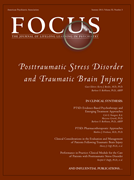The recent Institute of Medicine (IOM) report estimates that as many as 520,000 of the “Operation Enduring Freedom” (OEF) and “Operation Iraqi Freedom” (OIF) service members from the conflicts in Afghanistan and Iraq, respectively, are expected to develop posttraumatic stress disorder (PTSD) (
1). Traumatic brain injury (TBI) is considered the “signature” wound of these recent conflicts, as protective body armor is allowing more service members to survive previously fatal injuries than in past conflicts (
2). These military personnel combined with the civilian prevalence estimates of about 7%−10% of the general population indicate that PTSD is a major public health concern (
3). Comorbidity is the rule rather than the exception with PTSD, as the majority of individuals with PTSD have more than one comorbid disorder, with the minority (17% women and 15% men) presenting with
only PTSD (
4). It is usually the comorbid conditions that bring them to the attention of healthcare and mental healthcare professionals rather than the PTSD. Therefore, we think it is imperative that all mental healthcare professionals screen for and respond to the presence of PTSD in their patients. To that end, we dedicate this issue of
FOCUS to PTSD and traumatic brain injury (TBI).
We are fortunate to have gathered the leaders in the field to educate us about the aspects every mental healthcare professional needs to know about PTSD and TBI. Terry Keane, the Associate Chief of Staff for Research & Development at the VA Boston Healthcare System and Director, Behavioral Science Division, of the National Center for Posttraumatic Stress Disorder (NCPTSD), highlights some of the unique patient management problems in assessing and treating PTSD. Murray Stein and Elizabeth Twamley review the consequences and dilemmas in TBI, especially considering the large overlap in the presentations of PTSD and TBI. Matthew Friedman, executive director of the NCPTSD, presents state-of-the-art pharmacotherapeutic approaches to PTSD. Maryrose Gerardi, Cole Youngner, and Barbara Rothbaum of the Trauma and Anxiety Recovery Program at Emory University review psychotherapy treatment approaches to PTSD. Shawn Cahill and RaeAnn Anderson discuss some fascinating ethical considerations of treating patients with PTSD. And lastly, Megan Kearns of the Centers for Disease Control, Suzanne Leaman of Emory University and the National Intrepid Centers of Excellence (NICoE), and Barbara Rothbaum discuss some exciting developments in the prevention of PTSD following trauma. Together, they present a comprehensive yet concise overview of the state-of-the-art issues and evidence for PTSD and TBI.
We hope you enjoy this issue of FOCUS.

